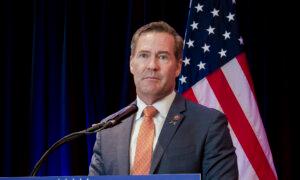Judge Merchan gave Trump an unconditional discharge, which means that no penalties were imposed.
NEW YORK CITY—New York Supreme Court Justice Juan Merchan on Jan. 10 gave President-elect Donald Trump an unconditional discharge in his sentencing in the business records case.
It’s a largely symbolic sentence that means that Trump does not face any penalties beyond having a conviction entered in his legal record. Merchan declined to impose any term of imprisonment or fines.
“It is the legal protections afforded to the office of the president of the United States that are extraordinary, not the occupant,” Merchan said as Trump listened during a virtual appearance.
Prosecutor Joshua Steinglass described Trump’s conduct throughout the case as a “direct attack on the rule of law itself.” He chastised Trump, suggesting the president-elect has made threats of retaliation against those who wronged him in legal matters.
When the state said that Trump sought to influence the election by unlawful means, Trump shook his head. The state’s statement focused on how Trump had expressed disdain for institutions and how he has been unrelenting in unsubstantiated attacks and argued that the president-elect’s threats were designed to have a chilling effect.
Still, Steinglass said an unconditional discharge is the “most practical sentence prior to his inauguration.”
Trump and his attorney Todd Blanche—whom he nominated as deputy attorney general—were on screen from Florida during the hearing. Trump was sporting a suit jacket and a red-striped tie. Behind them were two American flags.
While the defense also favored a sentence of unconditional discharge, Blanche rebutted the prosecution.
“I very, very much disagree with much of what the government just said about this case, about the legitimacy of what happened in this courtroom during this trial, and about President Trump’s conduct fighting this case,” he said.
Blanche said his team would appeal and that it wasn’t the appropriate time to bring the case, describing the proceedings as a sad day for the country.
Trump, appearing virtually via Teams, spoke next.
“This has been a very terrible experience. I think it has been a tremendous setback for New York and the New York court system,” he said, describing the case as a “political witch hunt.”
Trump argued that he was not involved with the records that triggered the case, that the payment was a legal expense, and that his business labeled it that way.
“I’m totally innocent. I did nothing wrong,” Trump said. “It was done to damage my reputation so that I would lose the election, and obviously, that didn’t work.”
He called the case a “weaponization” of government.
The hearing occurred just 10 days before Trump’s scheduled inauguration on Jan. 20, at which time he will receive constitutional protection against additional lawsuits. For years, Trump has been dogged by legal battles, including the business records case over which Merchan presided, as well as three other criminal prosecutions.

Illustration by The Epoch Times, Getty Images
During that time, he has publicly sparred with jurists and attorneys, alleging illegitimate, politically motivated lawfare.
In Merchan’s court, Trump faced multiple gag orders and was held in contempt 10 times. A jury found Trump guilty in May on 34 felony counts of falsifying business records.
“Never before has this court been presented with such a unique and remarkable set of circumstances,” Merchan said during sentencing on Jan. 10. “
Merchan asserted that “Donald Trump the ordinary citizen, Donald Trump the criminal defendant” would not be entitled to the presidency’s protections. He said that office is the only one that shields Trump from the verdict’s seriousness.
He wished Trump “Godspeed” as he prepares for a second term in office before Merchan left the bench.
Trump also notably called the judge’s impartiality into question when he requested Merchan’s recusal, citing his daughter’s relationship with a Democratic group.
Trump had attempted to halt sentencing with multiple appeals to New York courts and the U.S. Supreme Court—each of which ultimately denied his requests. The case could nonetheless spawn future appeals and result in the conviction being overturned.
So far, Trump has raised numerous objections to the cases against him, and focused in particular on the argument that presidential immunity protected actions he took during his first term.
Those actions included an alleged attempt to cover up a payment to adult film actress Stephanie Clifford (known as Stormy Daniels). The purported hush money was the subject of Manhattan District Attorney Alvin Bragg’s prosecution.
When Merchan scheduled sentencing in a Jan. 3 order, he indicated that various concerns, including presidential immunity, disposed him against imposing a period of incarceration.
In December, Merchan rejected Trump’s argument that presidential immunity undermined the evidence Bragg used and that, because of that flaw, Merchan should throw out the case.
The New York judge said that Trump waited too long or failed to preserve objections to evidence. He ruled that information related to both preserved and unpreserved arguments did not receive protection under the doctrine of presidential immunity.
“This Court … finds that the evidence related to the preserved claims relate entirely to unofficial conduct and thus, receive no immunity protections,” Merchan wrote in his opinion. The judge ruled that the unpreserved claims likewise received no immunity protections.
The president-elect said the case itself is illegitimate, and an opinion written by Merchan “goes against our Constitution, and, if allowed to stand, would be the end of the Presidency as we know it.”
The Associated Press contributed to this report.
Original News Source Link – Epoch Times
Running For Office? Conservative Campaign Consulting – Election Day Strategies!


